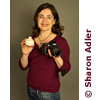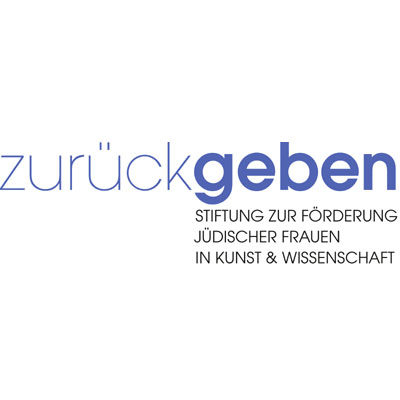AVIVA-Berlin >
Jüdisches Leben > Writing Girls
AVIVA-BERLIN.de 7/25/5786 -
Beitrag vom 22.10.2012

Helga Simon - The lady of the Camera
Daniela Rusowsky
Director and writer Daniela Rusowsky met with living legend of society photography, Helga Simon (born 1928), at her apartment in Berlin, where she talked about how her mother saved her life inãÎ
ãÎ Nazi Germany and how later she came to document the Jewish Community of Berlin with her pictures.
Helga Simon opens the door suspiciously, and looks through the aperture while leaving the safety chain on. She has heard about the attacks on older women and knows too well how hard life can be and how easy it can be to lose it. Once she recognizes us, she puts the guard down and we are welcome without problems. Her apartment is spacious and has high walls, where countless papers, boxes and photo albums fill the shelves up to the ceiling. She moves with some difficulty, her health has deteriorated rapidly over the last few years, but despite a progressive blindness, to stop working is not something that is in her plans.
My husband has accompanied me as a translator. Helga offers us a seat, which she must first clear from pictures and documents, laying them on the table. She has selected photographs from different periods to show them to us as an example of her work. Before starting the interview she makes things very clear: she doesnôÇt want to talk about religion or about her age. She doesnôÇt hide it, and tells us openly that she was born in 1928, but does not want it to be an important issue for the article. She wants to be recognized for her achievements and talent, not for her longevity or her beliefs. And I feel sheôÇs right because the merit of Helga Simon is not to have aged, but having worked for her existence every day of her life.
She was born in Berlin when the city was one of the most vibrant places in the world. Daughter of a famous dressmaker from a German protestant family, and a war hero of Jewish origin, Helga grew up without major conflicts between the two cultures that surrounded her. With World War II everything changed, and despite all the years that have passed, the ingratitude with which her country treated her father still hurts.
"My father was deported to Auschwitz and was even given an award for bravery during the First World War. He enlisted in the war voluntarily. He was born in 1896 when he was still very young, and was wounded in the lung (...) Over time he developed heart problems and afterwards tuberculosis. My father was an employee of Dresdner Bank, but his health deteriorated so much that he could not work any longer. I remember as a child that he could not be with us because his disease was contagious. He went to live with his parents and I remember that when I visited him, he was always coughing."

She continues her story firmly, as if even telling her own story still seems unbelievable for her to have lived it.
"My mother had two fashion stores in Berlin, one in Kastanienallee 101, near Prater, and another one near the Schultheiss brewery in SchûÑnhauser Allee 44. My mother designed and made clothes and was very successful, she was very famous as a fashion designer and also had an advertisement in the subway station at Danziger Straûe, which said Fashion ESK (Else Simon Kastanienallee). In the old phone book you can find where it says fashion ESK", Helga says proudly.
Suddenly her face changes and relives again the terror of the "Kristallnacht" ("night of broken glass"), which shattered her life and also her motherôÇs.
"My mother had a competitor who was upset because my mother was so successful. He also had a fashion store. When he realized that IôÇm Jewish, he wrote drew on the Kristallnacht on the window of my motherôÇs shop, a Star of David and wrote in black letters "Jewish child". So I learned why I had to pack my things and leave school. That was Kristallnacht, when I was ten years old".
The following years were difficult. One day the director of the public school in Eberswalder Straûe entered the room and asked her to pack her things and leave. Then she realized that it was because they did not admit children of Jewish parents in that school any longer. His mother looked for a private school where she was accepted but after a bomb exploded near their apartment, her mother decided it was safer to leave Berlin. Her mother got her an identity card which was not marked with the letter "J", and that allowed them to live in relative anonymity at the home of her motherôÇs relatives in Insterburg, in East Prussia.
"The identity card saved my life. Then came the Russians. (...). When the war ended, I was 17 years old and my mother decided to flee from Prussia to our house in Berlin. She got a cart with two horses to carry the things we wanted to save. Among the refugee caravan there were German soldiers who were deserters, and the Americans bombed the caravan of refugees. Then my mother put a dog on me, we could not escape, everything happened so suddenly and pretty fast. My mother was right, she told me, ôÇMy child, you will survive the war unscathed, but not me.ôÇ (...) She barely had time to put the dog on my head and they fired. And one bullet hit the dog and it fell dead on my head and saved my life ... IôÇll never forget it."
Her story continues as the anguish of not remembering all the details comes back, the anxiety and confusion of that moment vividly returns. She does not know if she lost consciousness, only that suddenly it was dark and she heard voices of German soldiers nearby. She was taken into a barn full of animals and refugees. She hid her fear and decided to stay with them so as not to freeze to death. She had lost her mother in the midst of confusion, not knowing whether she was alive or dead. She looked at them and said,
"I miss my motherãÎ" Helga Simon continues her story without pause, and with passion. "Then I described what my mother was wearing and then two soldiers told me that they had found her, but she was shot and injured and could not even walk. They also said that they had taken her to cure her wounds."
Which was a relief, as the days turned into a mystery which was never solved. Helga does not know if her mother eventually died of her injuries or what really happened to her. She never saw her mother again, but in her heart she knew from that moment that she was an orphan.
Afterwards, she managed to take a train to Demmin where she went to the winter aid department. There a woman took pity on her, and took her home and gave her clean clothes. When the womanôÇs husband came dressed in a Nazi uniform, Helga felt fear, but said nothing. She ate and recovered a bit and then escaped, knowing that she could be discovered as a Jewish girl. She learned later by a resident of the area with whom she kept in contact, that the couple later committed suicide by drowning themselves in the lake. Helga finally made it to Berlin where she began working as a nurse. She thought of emigrating from Germany, but things did not work out and she resigned herself to stay in Berlin, after all, it was her birthplace and she still felt the city was her home.
"I had decided I wanted to emigrate, that is correct. But I met two girls who lived here in Berlin, who were all very nice to me, and also their parents. Well, and then I told myself that Berlin is also my home, I was born here and I decided to stay in Berlin. Well, I also met Provost Heinrich Grû¥ber. He then put me in contact with Galinski. If this had not been the case, then with no doubt I would have emigrated."
It was through the Department for the victims of fascism, where she contacted Heinz Galinski, long before he became president of the Jewish community. He offered her help and treated her as if she were his own daughter. That was the beginning of a long and lasting friendship that would change the fate of Helga Simon. Galinski encouraged her to formally convert to Judaism and also to start working professionally as a photographer, becoming the official photographer of the Jewish Community of Berlin. Today, Helga Simon has witnessed the evolution of the community from its very beginning, and has a picture collection at her home, which is a real archive of the history of the community in Berlin.
Her presence is a green light to any community activity, whether social, educational, sportive or a religious event. Helga Simon is there to keep record. In her opinion, the most significant change in the community has been the absorption of Jews from the Block of the former Soviet Union. Somehow this change makes her feel uncomfortable, maybe it reminds her of her escape from the Russian army where she lost her mother, or perhaps simply because it has gradually erased the spirit of the German Jewish community with which she feels most identified.
"If I go to an event, I only hear people speaking Russian. I barely hear anybody speaking German any longer. For me personally, it makes me sad that this has changed so much. For those who really come from Germany and survived the war, and these people are becoming fewer and fewer, right? Official speeches, of course are in German, but there is almost always someone who translates them into Russian."
When the war was over, Helga Simon needed to earn a living, and photography became the way for her to do so, and also her reason to live. In addition to assuming the role of photographer of the Jewish community, which was mainly a daytime job, at night she worked as the official photographer at the Cafûˋ Keese in Bismarckstraûe.
"For forty years I have attended the Cafûˋ Keese every night to take pictures of the customers. It never bothered me to work day and night (...) So I had no man, I had no time (...). Of course there were men interested in me, but I did not have time (...) I am married to my camera. I have been faithful to my camera, but not to men."
Helga Simon has a restless spirit and a passion for photography. She has adapted to technological changes with astonishing ease.
"With digital photography everything is now working better than ever. Because now it is no longer necessary to use films which cost a lot of money. The chips can even be erased and reused. All this is not as expensive as before."
While she admits that the shift to digital technology caused her no trouble, using computers has not been so easy:
"There is a young man who always comes to help when time allows. He knows about image processing and is familiar with the software."
Although she is open to receive help if she needs it, her work has always been rather independent. During her career she trained some young people who were interested in developing a career in photography, and had some helpers in her study, but not permanently. Helga Simon has always enjoyed her autonomy, and moves in the world photographing the lives of others, capturing moments for posterity.

She doesnôÇt mind the type of the event, her mission is to capture the right moment with a click of her camera. She dislikes photographers who take one shot after the other. For her, you just have to know when to shoot, maybe this is a habit she kept from the times when using materials wisely, this was key for a profitable business. She can be found working as naturally in a religious ceremony, a football game or a board meeting. For her there is no difference between portraying the presidents of Germany ã in fact she has portrayed them all ã or the naked girls at the Venus Erotic Fair, which she annually attends. When asked who she would like to photograph she doesnôÇt know what to answer, because before her eyes there is no difference, they are all human beings who pose in front of her lens. Nor can she specify in detail if any of her work has been especially rewarding for her. While she doesnôÇt hide her pride at having photographed renowned politicians, she also remembers with the same pride having photographed an animal-keeper of Berlin Zoo, but she cannot remember his name.
Helga Simon is simple and straight forward. She stands up and checks her commitments that are written in her diary, thinks loud and gets a little bit tense, as if everydaylife bothers her, or perhaps sheôÇs angry about the current fragility of her memory. We tell her that we would like to take some pictures of her near the portraits of her as a young woman. She combs her white hair in the same hairstyle of her youth, sits down, turns her head and smiles in the same pose she had when she looked at the camera so many times throughout her life. The phone rings and she has a short conversation. Then she asks us whether we can take her to a Makabi sport event on Sunday because she has no one to help her to get to there and sheôÇs already committed to attend. I can feel the price of loneliness, and I realize why Helga Simon holds her camera like a castaway grabbing a piece of wood floating in the sea, and will not release it until the last day of her life.

Daniela Rusowsky F.
I was born in ViûÝa del Mar, Chile, in 1974, where I lived till 1998, when I moved to Santiago. I have experience as a producer, documentary director, corporate communications consultant and writer. I have a Licenciate degree in Social Communication and a Masters in Anthropology and Development. I have lived in Chile, Puerto Rico, Jersey (Channel Islands, GB). In the middle of 2010 my husband - a German national - unexpectedly lost his job and we were forced to migrate in search of new opportunities. I am currently based in Germany, where I live with my husband and our two young daughters. In 2012 I won a scholarship from the Zurû¥ckgeben Foundation, which allowed me produce a documentary about Jewish cooking in Berlin. I am a full-time mother, l am very passionate about cooking and I love to go trekking or biking with my family. I have travelled to almost 20 countries on 4 different continents. I am fluent in Spanish and English, and have knowledge of German and French.

Daniela Rusowsky F.
Director of Communications
Funk Productions / Nature Heritage
Berlin, Germany
www.natureheritage.org
Copyright Fotos: ôˋStephan M Funk
Das Projekt "Jû¥dische Frauengeschichte(n) in Berlin - Writing Girls - Journalismus in den Neuen Medien" wurde ermûÑglich durch eine Kooperation der Stiftung ZURûCKGEBEN, Stiftung zur FûÑrderung jû¥discher Frauen in Kunst und Wissenschaft

und der Stiftung Erinnerung, Verantwortung und Zukunft (EVZ)

Weitere Informationen finden Sie unter:
www.stiftung-zurueckgeben.de
www.stiftung-evz.de
